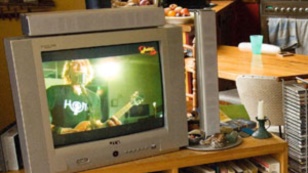Now, the VOA Special English program Words andTheir Stories.
Some unusual words describe how a person spendshis or her time. For example, someone who likes tospend a lot of time sitting or lying down while watchingtelevision is sometimes called a couch potato. A couchis a piece of furniture that people sit on while watchingtelevision.
Robert Armstrong, an artist from California, developedthe term couch potato in nineteen seventy-six. Severalyears later, he listed the term as a trademark with theUnited States government. Mister Armstrong also helped write a funny bookabout life as a full-time television watcher. It is called the “Official CouchPotato Handbook.”
 |
|
Couch potatoes enjoy watching television |
Couch potatoes enjoy watching television just as mouse potatoes enjoyworking on computers. A computer mouse is the device that moves thepointer, or cursor, on a computer screen. The description of mouse potatobecame popular in nineteen ninety-three. American writer Alice Kahn is said tohave invented the term to describe young people who spend a lot of timeusing computers.
Too much time inside the house using a computer or watching television cancause someone to get cabin fever. A cabin is a simple house usually built faraway from the city. People go to a cabin to relax and enjoy quiet time.
Cabin fever is not really a disease. However, people can experience boredomand restlessness if they spend too much time inside their homes. This isespecially true during the winter when it is too cold or snowy to do thingsoutside. Often children get cabin fever if they cannot go outside to play. So dotheir parents. This happens when there is so much snow that schools andeven offices and stores are closed.
Some people enjoy spending a lot of time in their homes to make them niceplaces to live. This is called nesting or cocooning. Birds build nests out ofsticks to hold their eggs and baby birds. Some insects build cocoons aroundthemselves for protection while they grow and change. Nests and cocoonsprovide security for wildlife. So people like the idea of nests and cocoons, too.
The terms cocooning and nesting became popular more than twenty yearsago. They describe people buying their first homes and filling them with manythings. These people then had children.
Now these children are grown and have left the nest. They are in college. Orthey are married and starting families of their own far away. Now theseparents are living alone without children in their empty nest. They havebecome empty nesters.
(THEME)
This VOA Special English program Words and Their Stories was written by JillMoss. I’m Faith Lapidus.







